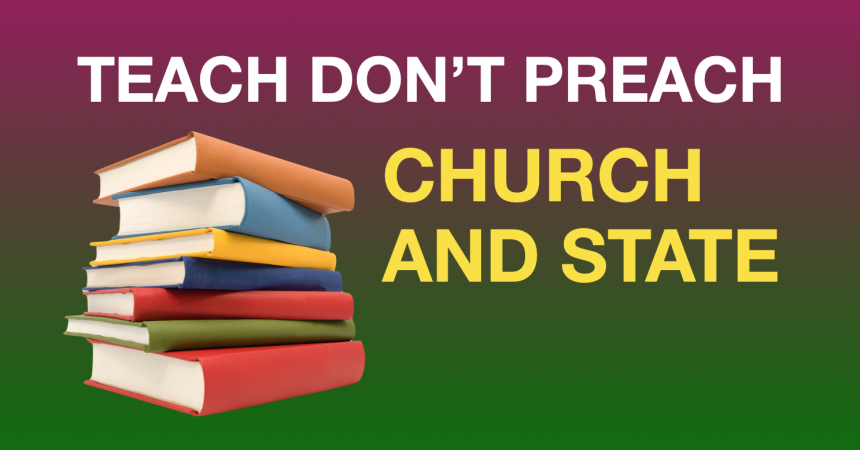
Irish State still allows Catholic Church to control Sex Education in Irish schools
Last week the Minister for Education, Richard Bruton, told Ruth Coppinger TD that the Relationship and Sexuality Education policy of schools should reflect the core values and ethos of the school as outlined in the school’s mission statement.
This goes against a United Nations recommendation, last year, that Ireland should integrate objective compulsory sex education into the school curriculum, and should closely monitor and evaluate its delivery by schools.
That recommendation came as a result of Atheist Ireland raising this issue with the Committee on the Elimination of Discrimination Against Women (CEDAW). It was the first time the UN has examined sex education in Irish schools.
Minister Bruton went on to say that where spiritual, moral, or ethical issues arise, when teaching Relationship and Sexuality Education, the school’s RSE policy should guide teachers in the treatment of such issues, in accordance with the ethos of the school.
This answer confirms that Minister Bruton, like his predecessors, is not prepared or committed to protecting the right of all students to objective Relationship and Sexuality education. Instead, the Minister will continue to support the mission of religious patrons to evangelise students.
This policy leaves the Catholic Church in control over the teaching of Relationship and Sexuality education in most of our schools.
Even some ETB schools and colleges, which are supposed to be the alternative to denominational schools, deliver Relationship and Sexuality education through the eyes of the Catholic Church.
Despite teachers being trained to delivered Relationship and Sexuality education, some ETB schools and colleges pay the Catholic agency Accord to deliver talks on the course.
For Written Answer on : 18/01/2018
Question Number(s): 104 Question Reference(s): 2576/18
Department: Education and Skills
QUESTION
To ask the Minister for Education and Skills his views on whether the delivery of relationships and sexuality education (RSE) by an organisation (details supplied) of one particular faith in Kildare and Wicklow ETB schools satisfies the requirement under circular 0037/2010 to have an objective RSE programme; his further views on whether ETB schools should avail of RSE services from one particular faith background; and if he will make a statement on the matter. (Details Supplied) email sent to dept @ 12.25 Attached are invoices from Kildare and Wicklow ETB showing payment to Accord.
REPLY
Circular 37/2010 requires that schools’ RSE policies are developed in consultation with teachers, parents/guardians, members of Boards of Management and students. The RSE policy should reflect the core values and ethos of the school as outlined in the school’s mission statement. Where spiritual, moral or ethical issues arise when teaching RSE, the school’s RSE policy should guide teachers in the treatment of such issues, in accordance with the ethos of the school. However, elements of the programme, such as family planning, sexually transmitted infections and sexual orientation, cannot be omitted on the grounds of school ethos, regardless of who is delivering, or assisting in the delivery of, the RSE programme in the school.
My Department provides clear guidance to schools on the engagement of outside speakers and on the use of external resources to assist in delivering the curriculum. These guidelines are outlined in circulars 0022/2010 and 0023/2010 for primary and post-primary schools respectively. These circulars are currently being updated.
Where an outside speaker is engaged by a school, he or she should be engaged in the context of delivering a planned and comprehensive programme in the school. He or she should not be brought in to replace the school programme but to enhance it. It is the responsibility of the school to ensure that outside speakers are aware of the school policy on RSE and child protection and their input should be delivered in that context. My Department recommends and provides guidance that the class teacher should always be present in the class in order that he or she is aware of what is being delivered and can ensure that this is in accordance with the school’s policy. Parents should also be informed when external speaker/agencies are engaged. Programmes delivered by visitors or external agencies must use appropriate evidence-based methodologies with clear educational outcomes.
Circulars 22/2010 and 23/2010 also require that all materials proposed for use by external providers must be approved in advance by the principal and Board of Management, be age and stage appropriate for pupils and be in line with the ethos of the school, and the principles of the SPHE curriculum. There is also a requirement to take account of all relevant school policies and procedures, including the school’s child protection policy, Relationships and Sexuality Education (RSE) policy and substance misuse policy.






0 Comments
No comments!
There are no comments yet, but you can be first to comment this article.